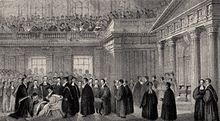- Wrangler (University of Cambridge)
-
For other uses, see Wrangler (disambiguation).
At the University of Cambridge in England, a 'Wrangler' is a student who gains first-class honours in the third year of the University's undergraduate degree in mathematics. The highest-scoring student is the Senior Wrangler, the second highest is the Second Wrangler, and so on. At the other end of the scale, the person who achieves the lowest exam marks, but still earns a third-class degree, is known as the wooden spoon.
Until 1909, the University made the rankings public. Since 1910 it has publicly revealed only the class of degree gained by each student. An examiner reveals the identity of the Senior Wrangler 'unofficially' by tipping his hat when reading out the person's name, but other rankings are communicated to each student privately. Therefore the names of only some 20th-century Senior Wranglers (such as Jacob Bronowski and Ben J. Green) have become publicly known.
Obtaining the position of a highly ranked Wrangler created many opportunities for the individual's subsequent profession. They would often become Fellows initially, before moving on to other professions, such as law, the Church, or medicine.[1] Throughout the United Kingdom and the British Empire, university mathematics professors were often among the top three Wranglers.[1]
The order of Wranglers was widely publicised and shaped the public perception of mathematics as being the most intellectually challenging of all subjects. According to Andrew Warwick, author of Masters of Theory, the term 'Senior Wrangler' became "synonymous with academic supremacy".
Contents
Past wranglers
See also: a list of Senior Wranglers since 1910 and a list of Senior Wranglers and Second Wranglers, 1748-1909.Top marks in the Cambridge mathematics exam did not always guarantee the Senior Wrangler success in life; the exams were largely a test of speed in applying familiar rules, and some of the most inventive and original students of Mathematics at Cambridge did not come top of their class. Bragg was third, Hardy was fourth, Sedgwick fifth, Malthus was ninth, Bertrand Russell was seventh, Keynes was 12th, and some fared even worse: Klaus Roth was not even a wrangler. The present Astronomer Royal, Martin Rees, a wrangler, would go on to become one of the world's leading scientists, while also holding the posts of Master of Trinity College (Cambridge) and President of the Royal Society[clarification needed].
The first woman to top the mathematics list was Philippa Fawcett in 1890. At the time, women were not officially ranked, although they were told how they had done compared to the male candidates, so she was ranked "above the Senior Wrangler".
Optimes
Students who achieve second-class and third-class mathematics degrees are known as Senior Optimes (second-class) and Junior Optimes (third-class). Cambridge did not divide its examination classification in mathematics into 2:1s and 2:2s until 1985 but now there are Senior Optimes Division 1 and Senior Optimes Division 2.[citation needed]
In popular culture
- 'The Senior Wrangler' is a member of the faculty of Unseen University in Terry Pratchett's Discworld series of novels
- The character of Roger Hamley in Elizabeth Gaskell's Wives and Daughters has achieved the rank of Senior Wrangler at Cambridge.
- Vivie Warren, the headstrong heroine of George Bernard Shaw's Mrs. Warren's Profession (1893) and daughter of the play's infamous madam, tied with the Third Wrangler, settling for that place because she recognized that "it was not worth [her] while to face the grind" because she did not intend an academic career for herself
- 'Wrangler' is a jargon term applied to codebreakers in some of John Le Carre's spy novels, such as Tinker Tailor Soldier Spy.
Notes
- ^ a b Forfar, D. O. (1996). "What became of the Senior Wranglers?" (PDF). Mathematical Spectrum (Applied Probability Trust) 29 (1). http://www.clerkmaxwellfoundation.org/WranglersWhatBecame2008_1_24.pdf. Retrieved 2008-09-25.
References
- Galton, Francis (1869). "Classification of Men According to their Natural Gifts". pp. 14–36. http://galton.org/books/hereditary-genius/index.html.
- D. O. Forfar (1996/7) What became of the senior wranglers?, Mathematical spectrum 29, 1-4.
- a survey of the subsequent careers of senior wranglers during the 157 years (1753–1909) in which the results of Cambridge’s mathematical tripos were published in order of merit.
- Peter Groenewegen (2003). A Soaring Eagle: Alfred Marshall 1842-1924. Cheltenham: Edward Elgar. ISBN 1-85898-151-4.
- gives the story about Rayleigh; Alfred Marshall was the commoner who came second to Rayleigh.
- C. M. Neale (1907) The Senior Wranglers of the University of Cambridge. Available online
- Andrew Warwick (2003) Masters of Theory: Cambridge and the Rise of Mathematical Physics. Chicago: University of Chicago Press. ISBN 0-226-87374-9
- a very thorough account of the Cambridge system in the 19th century. Appendix A lists the top 10 wranglers from 1865 to 1909 with their coaches and their colleges.
External links
Information on the wranglers in the period 1860-1940 can be extracted from the BritMath database:
Many of the wranglers who made careers in mathematics can be identified by searching on "wrangler" in:
University of Cambridge 
Chancellor: The Lord Sainsbury of Turville (list) · Vice-Chancellor: Sir Leszek Borysiewicz (list)
Colleges: Christ’s • Churchill • Clare • Clare Hall • Corpus Christi • Darwin • Downing • Emmanuel • Fitzwilliam • Girton • Gonville and Caius • Homerton • Hughes Hall • Jesus • King’s • Lucy Cavendish • Magdalene • Murray Edwards (New Hall) • Newnham • Pembroke • Peterhouse • Queens’ • Robinson • St Catharine’s • St Edmund’s • St John’s • Selwyn • Sidney Sussex • Trinity • Trinity Hall • Wolfson
Categories: University • Chancellors • Vice-Chancellors • Colleges • Heads of Colleges • Departments • Academics • Alumni • Awards and Prizes
Websites: University • Students’ Union • Graduate Union
 Categories:
Categories:- 1748 establishments
- 1909 disestablishments
- Awards and prizes of the University of Cambridge
- Mathematics education
- Mathematics awards
- Senior Wranglers
- Second Wranglers
- Terminology of the University of Cambridge
Wikimedia Foundation. 2010.

